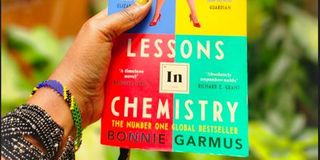‘Lessons in Chemistry’ by Bonnie Garmus - Chemistry is life

What you need to know:
- One of the book's most compelling insights is how the author skilfully addresses the motherhood dilemma, shedding light on the often unspoken emotions many women experience on the topic.
The 1960s were the most transformative years for many African countries, including Tanganyika, which gained independence in 1961. Despite women's roles in the struggle, their contributions have been sidelined or forgotten.
Globally, the 1960s were marked by similar struggles due to the lack of recognition for women. For example, according to the John F. Kennedy Library and Museum, women in the United States faced many barriers, such as unequal pay—earning only 60 percent of what men earned.
Bonnie Garmus's Lessons in Chemistry offers a fictional perspective of these struggles through the eyes of Elizabeth Zott, a chemist fighting these prejudices as a woman in her time.
Garmus portrays Elizabeth Zott as more than a hard-working chemist who is also a symbol of resistance against a system designed to put women down. She works at a male-dominated research institute named Hastings.
Elizabeth faces many obstacles at work. Her male colleagues never take her seriously; they steal her ideas, attack her character, and subject her to sexual harassment simply because she is a woman.
She lives in an era when women are expected to stay at home, and when they are allowed to work, they are relegated to roles like nursing, teaching, or secretarial duties. Despite these challenges, Elizabeth fights fiercely for her right to exist as both a professional and an individual.
She meets Calvin Evans, a renowned, award-winning chemist at the institute, who initially mistakes her for a secretary, reflecting the expectation that women in the workforce held such roles. However, they soon become inseparable.
"I fell in love with Calvin because he was intelligent and kind, but also because he was the very first man to take me seriously. Imagine if all men took women seriously. Education would change. The workforce would revolutionise. Marriage counsellors would go out of business."
This story is about chemistry in the real world and love—Elizabeth and Calvin's love is like natural chemistry, an undeniable attraction between opposites.
Garmus makes one appreciate the world's progress in achieving greater equality regarding opportunities and fundamental human rights.
Without these efforts, women would not be able to access the options and chances we have now, such as working, speaking up for ourselves, and having equal rights. More work still needs to be done, but we have come a long way.
One of the most interesting thoughts in the book is how the author aptly brings up the motherhood dilemma, highlighting the often unspoken feelings many women have on the subject.
This is evident when Elizabeth finds herself pregnant and alone. In many societies, women are expected to embrace motherhood instinctively, with the pressures to fulfil their roles in silence, often without acknowledging the challenges and hardships that come with being a mother.
The Mother of Violations: Motherhood as the Primary Expectation of Women study found that voluntarily childless women face harsher societal penalties than women violating other gender norms" (British Journal of Social Psychology, 2023).
"When you think about it, rowing is almost exactly like raising children. Both require patience, endurance, strength, and commitment. And neither allow us to see where we're going—only where we've been."
Through Harriet, Elizabeth's neighbour, the author shows how important it is to have a community we can lean on in times of need. A community that encourages you to be your own person, even in motherhood.
Harriet becomes Elizabeth's friend and confidant during her most challenging times. She advises her on caring for Mad, Elizabeth's only daughter, while also reminding her to take care of herself. She encourages her to carve out moments that are solely for her, allowing her to reconnect with her inner self.
The book also raises the question of the power of the media. Garmus highlights how the media can both constrain and empower women.
Through her cooking show, Supper at 6, Elizabeth uses this platform to challenge the status quo and inspire women to pursue their dreams. It raises the question of who sets the agenda in today's digital influence and social media world and why.
This fast-paced book is a good choice if you enjoy science, history, and a strong female main character. It is also thought-provoking, discussing issues of science and faith. Garmus's humorous writing style will draw you in and leave you reflecting on how far we have come to achieving equality and how far we still have to go.
Remember: "Courage is the root of change—and change is what we're chemically designed to do."
Jane Shussa is passionate about books, coffee, nature, and travel. She serves as a Senior Digital Communications Officer for Twaweza East Africa.



